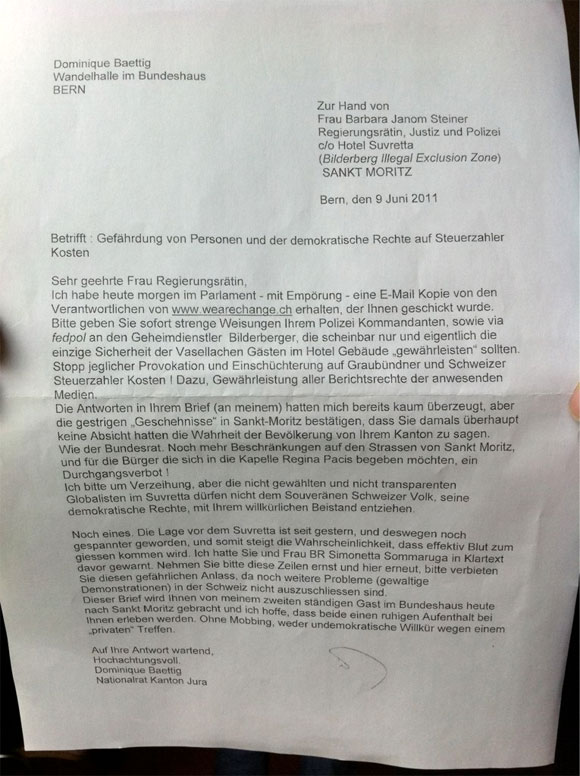Is a New American Reichstag in the Works?
August 18, 2011
By Luis R. Miranda
The Real Agenda
August 17, 2011
That is what chatter coming from the United States government seems to suggest. A few weeks ago, we reported on how a video from the Department of Homeland Security(DHS) incited fear of ‘white Al-Qaeda’ terrorists and just a day after publication, Anders Breivik blew up a government building in Oslo, Norway.

The U.S. government is preaching the idea that a new Oklahoma City style attack is coming.
Since Oslo, the very same Department of Homeland Security has put out a new Public Service Announcement where they go at it again. The white American is the threat. Somehow the U.S. Government found a way to move the threat from Islamic fundamentalists to Americans who support Constitutionalism.
In the new ad, DHS presents new ‘white faces’ while calling for a high state of vigilance from the part of the citizenry to report any ‘suspicious’ or ‘out of the ordinary’ activity. As in previous occasions, no clear definition of ‘suspicious’ or ‘out of the ordinary’ is given. This technique, as we reported before, is a psychological operation to instigate fear and distrust on the public so that they not only accept the government’s message of fear, but also turn against their neighbors and family members and tattle tale about their questioning of government policies.
Back in the days of the infamous Nazi party, Adolf Hitler used the false threat of a foreign force planning to attack Germany in order to push the public to accept his insane power grab, that ended in the death of Jews, Christians, and any other members of groups that opposed his policies. Hitler only failed on his attempt to take over Europe and the world, because his handlers had already achieved their goal to ramp up the war movement by playing Hitler against other military forces.
The threat of a ‘lone wolf’ style terror attack in the United States then is the solution to save the drastically faded Obama presidency. If you think this is insane, take a look at this article on the Financial Times of London, where Robert Shapiro, a former White House aide to Bill Clinton suggested that barring a terror attack, the Obama administration was doomed. We must add to this Barack Obama’s own assessment which included his thought that the United States could absorb another terror attack of the size of 9/11.
Yesterday, Barack Obama came out to reinforce even more the supposed threat of homegrown terrorism during an interview on CNN. While responding to a comment from Wolf Blitzer, Obama identified the possibility that a single person could cause a major terror attack. “We are vigilant and constantly monitoring the threat of a terrorist attack… The risk is always there… The risk we are concerned now is the ‘lone wolf’ threat, a single person with a weapon, someone being able to carry out the type of massacre we saw in Norway recently.” Of course, it has been proven that Anders Breivik did not act alone. In fact, even main stream media reports confirm that Breivik called police several times to turn himself in before the attacks.
A couple of days ago, New York Times writer Paul Krugman came out and suggested the United States would benefit greatly if a new threat such as the invasion of aliens happened because it would allow the government to launch wars and therefore revive the economy. This train of thought would be funny if it wasn’t because what Krugman suggested was exactly the agenda carried out in World Wars I and II. Upon the evident economic crisis, the Globalists decided to play nations against nations in order to spur manufacturing of war machinery, create jobs within the military industrial complex and start fresh again after the wars were over. But at what human cost?
What does the new DHS Ad say?
Picking up where they left off a few weeks ago, the Department of Homeland Security headed by Secretary Janet Napolitano, continues its fear mongering campaign to get people to accept the next big terrorist attack and the Police State measures that will stem from it.
In the video, DHS shows a white young man driving a cab. He stops by what seems to be a bus or train station, opens the trunk of the cab and activates what appears to be an explosive device. At the same time, two passengers inside the station see a suspicious looking woman walking inside the station as she flies by them. And guess what, she’s white, too. A white man who observes the white taxi driver walking away from the cab is then shown talking to a police officer in a supposed attempt to denounce the suspicious activity.
What can we get from this? When looked at it in more than one dimension, it is clear that once again the DHS intends to portray whites as dangerous, especially white middle class people. In order to understand this trick, one needs to connect the ad to the current financial situation, where mostly middle class and the poor (taxi drivers and public transportation users) are being robbed of their future. Everywhere in the world, it is the middle and poor class the ones rising up against the Globalist attempt to further consolidate economic and military power. After Anders Breivik allegedly attacked the federal building in Oslo, authorities beefed up security in the capital and other cities in Norway. After the last riots in London, in another Problem, Reaction, Solution scheme, a crowd of criminals attacked local businesses and homes. The British government decided to use face recognition technology on the streets to scan and store imagery from anyone who “may be or act suspicious”. Previous to the attacks, police stood down and let the looters do whatever they wanted and now they want to scan everyone’s faces.
Back in the United States the corporate prostitute media continues to eco Obama’s speech about the threat of a ‘lone wolf’ attack. On Tuesday, CBS News said the next attack would not come from Islamic terrorists, but from a member of the “Sovereign Citizen” movement in the United States, that is everyone calling for the end of the Federal Reserve, the end of the wars, the reactivation of the economy, the adoption of sound fiscal and monetary policies and the end of interventionism and empire building. Going by the recent polls, this group of people now labeled as “dangerous” by the federal government, includes a powerful minority who is armed and ready to defend their rights to speak freely, own and carry weapons to protect themselves and their families from rising crime, public protest against insane government policies and anyone who supports Ron Paul and anyone and anything that smells like Constitutionalism.
Naturally, the government knows that it does not take a majority to get the government back to the people, but a really well-educated and armed minority to eject the current invaders who occupy the United States of America, or for that matter every other country in the western world. That is why the government continues to move initiatives to discretely ban the second amendment carrying out stings in gun shows and invading private property to look for legally held fire arms. Obama himself is an “in the closet” gun grabber. So are Rick Perry and Mitt Romney. In April, the newspaper the Star-Tribune reported that the Federal Bureau of Investigation is spying on citizens in Wyoming to keep tabs on their use of fire arms. FBI agent Kathy Wright said that “the bureau has kept an eye on the movement because some sovereigns have taken the logical step from belief in the illegitimacy of the current system to acting violently against it.”
What could come from a situation where a disarmed society is unable to protect itself from crime and the abuses of government? Ask relatives of people who survived the Nazi atrocities, ask the people of Oklahoma City, the people from Virginia Tech, from New York, and more recently from Norway. What could stem from an educated society that freely carries fire arms to defend itself? Ask the citizens of Switzerland and Texas.


 Agreement (ACTA) recently concluded in New Zealand — and in the face of public pressure, a version of the text was subsequently made available to the public. The ACTA is neither a trade agreement nor one focused primarily on counterfeiting, but a copyright deal featuring provisions on Internet service provider and Internet company liability, DMCA-style notice and takedown requirements, legal protection for digital locks, and requirements for statutory damages that could result in millions in liability for non-commercial infringement — even heightened searches at border crossings.
Agreement (ACTA) recently concluded in New Zealand — and in the face of public pressure, a version of the text was subsequently made available to the public. The ACTA is neither a trade agreement nor one focused primarily on counterfeiting, but a copyright deal featuring provisions on Internet service provider and Internet company liability, DMCA-style notice and takedown requirements, legal protection for digital locks, and requirements for statutory damages that could result in millions in liability for non-commercial infringement — even heightened searches at border crossings.